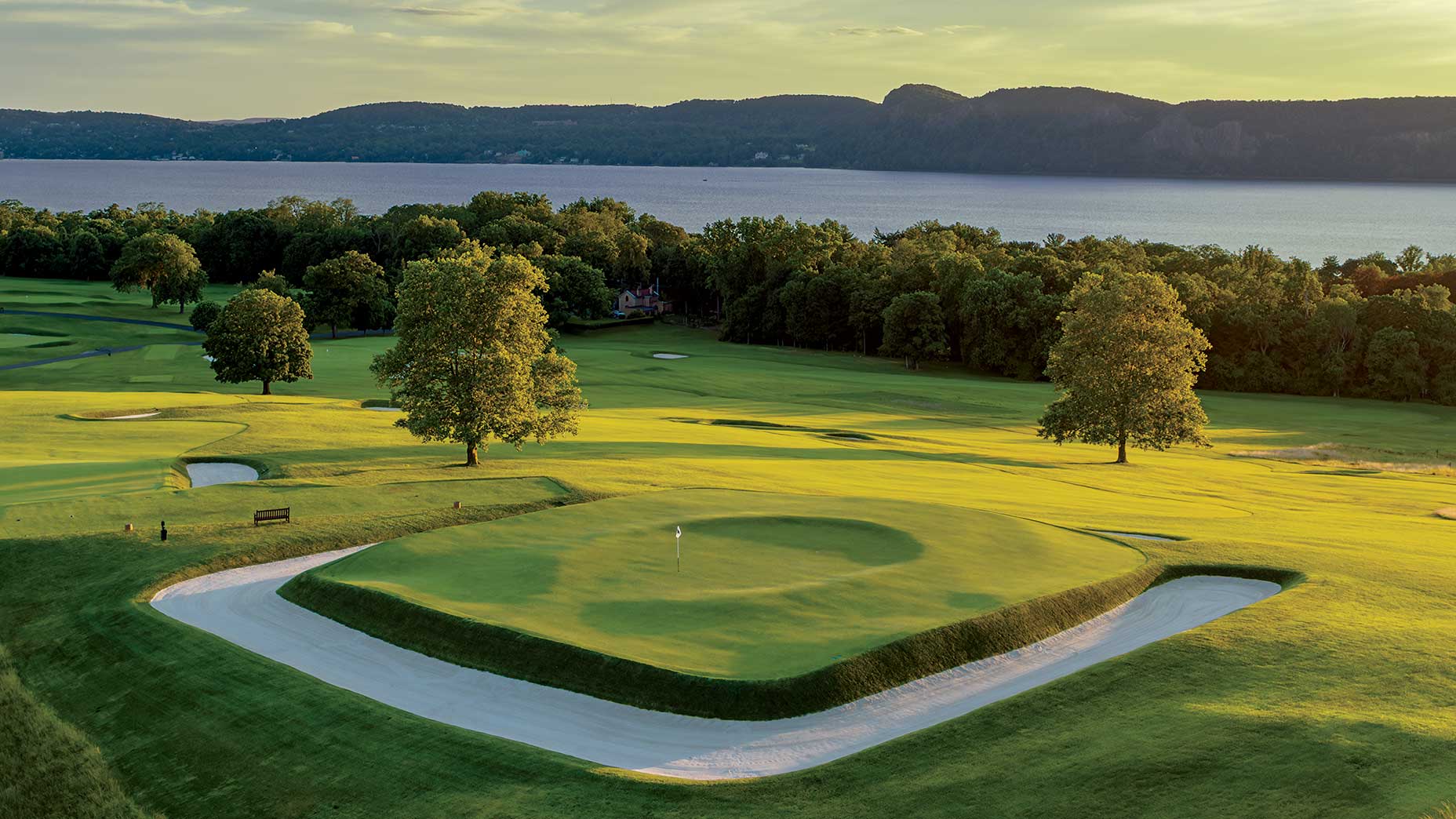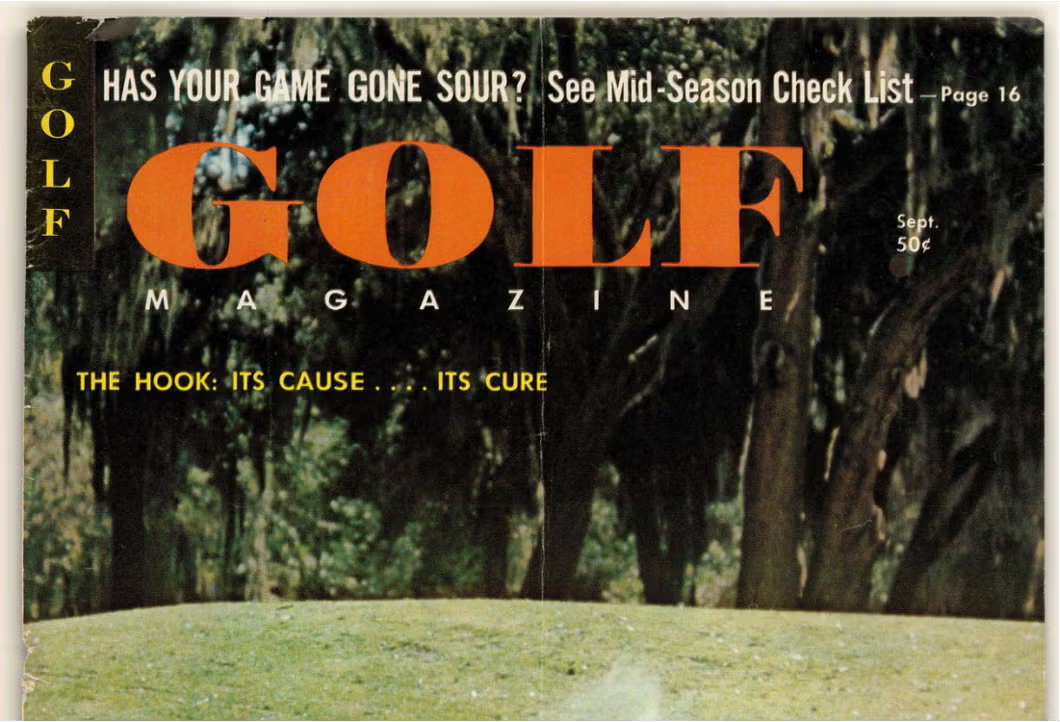Made in America: The 100 best golf holes in the U.S.
- Share on Facebook
- Share on Twitter
- Share by Email

The par-3 16th hole at Sleepy Hollow in Scarborough, N.Y.
Evan Schiller
Among architecture buffs, the term “signature hole” is pretty much forbidden, dismissed for its emphasis on optics. Whether a hole is photogenic should not be the standard by which it’s judged. What’s more, the thinking goes, narrowing the focus to a single hole distracts attention from where it belongs — on the entirety of the course.
That makes sense. But it doesn’t make individual holes off-limits for discussion.
What constitutes a great hole? In Alister MacKenzie’s view, the best holes were those that gave the greatest enjoyment to the greatest number of golfers. A nice definition. But enjoyment can spring from many sources. Aesthetics, for instance. Strategic challenge. A fair balance of penalties and payoffs.
The 100 best golf holes in the U.S.
To compile this list of America’s 100 finest holes, we drew on the expertise of GOLF’s course raters and well-traveled staffers. It was, by definition, a subjective exercise. But we applied some strictures: No course could be represented more than twice. And no two holes from the same course could be the same par value; while the par-3 15th and 16th holes at Cypress Point are both astounding, only one could make the cut. Not surprisingly, many of the holes on the final roster come from properties on our ranking of the Top 100 Courses in the U.S., which comprise a mix of public and private clubs. They also reflect the great variety and geographic range of golf in this country.
It is, we believe, an authoritative list. But it is also meant to inspire debate. Let the arguments begin.

GOLF’s other course rankings: Top 100 in the World | Top 100 Courses in the U.S. | Top 100 You Can Play | Top 100 Value Courses in the U.S. | America’s Best Municipal Courses | America’s Best Courses for $100 or Less | Top 100 in the U.K. and Ireland | Top 100 in Asia-Pacific | Top 100 Short Courses in the World
*Denotes a public course
THE BEST PAR 3s IN AMERICA
Par 3s pose a paradox. With ball in hand and the right to place it, golfers perk up at the prospect of playing to the green from a perfect lie. Opportunity awaits. But designers understand this. Recognizing the need to stiffen their defenses, they protect their shortest holes with forced carries, fearsome hazards and defiant putting surfaces, resulting in many of the game’s most dramatic and demanding shots. These 25 par 3s epitomize that design genius.
Hole #12, Augusta National GC
Augusta, Ga.
ARCHITECTS: ALISTER MACKENZIE, BOBBY JONES
Hole #10, Bel-Air
Los Angeles, Calif.
ARCHITECTS: GEORGE C. THOMAS JR., WILLIAM F. BELL
Hole #3, Cabot Citrus Farms (Karoo)*
Brooksville, Fla.
ARCHITECT: KYLE FRANZ
Size matters. So does hole location on a green so large that the span between a front and back pin can amount to a four-club difference. On paper, from the tips, the yardage is imposing, but a kick-slope short and right feeds balls onto a putting surface that’s tucked into a giant, forgiving bowl.
Hole #12, California GC of San Francisco
South San Francisco, Calif.
ARCHITECTS: A.V. MACAN, ALISTER MACKENZIE, KYLE PHILLIPS
Hole #18, CapRock Ranch
Valentine, Neb.
ARCHITECTS: GIL HANSE, JIM WAGNER
Hole #16, Cypress Point
Pebble Beach, Calif.
ARCHITECT: ALISTER MACKENZIE
Playing the hero shot is not, in fact, required on this famously heroic hole, as MacKenzie left room for a layup around the ocean cove. But it’s hard not to heed the words of his associate Robert Hunter, who rightly observed that the 16th at Cypress was “most thrilling when played bang over the 200 yards of wild and rocky coast.”

Hole #5, Fishers Island
Fishers Island, N.Y.
ARCHITECT: SETH RAYNOR
Hole #3, Kittansett
Marion, Mass.
ARCHITECTS: WILLIAM FLYNN, FRED HOOD
Hole #7, Lawsonia (Links)*
Green Lake, Wis.
ARCHITECTS: BILL LANGFORD, TED MOREAU
Langford and Moreau were big on steam shovels, but it’s said that the duo buried a railroad boxcar beneath this bulging and beguiling green, which is partly shrouded from the tee and defended by imposing 20-foot drop-offs front and right.

Hole #11, Los Angeles (North)
Los Angeles, Calif.
ARCHITECT: GEORGE C. THOMAS JR.
Hole #17, Merion (East)
Ardmore, Pa.
ARCHITECT: HUGH WILSON
Hole #9, Myopia Hunt Club
South Hamilton, Mass.
ARCHITECT: H.C. LEEDS
Hole #4, National Golf Links of America
Southampton, N.Y.
ARCHITECT: C.B. MACDONALD
A nod to the 15th hole at North Berwick, this Macdonald template is widely seen as an upgrade on the original and, in many eyes, the finest Redan in the world, with all the defining traits taken up a notch, including a steep kick slope and a deep front-left bunker that deters direct shots to a severe green.

Hole 7, Pebble Beach*
Pebble Beach, Calif.
ARCHITECTS: JACK NEVILLE, DOUGLAS GRANT
“The first six holes are something of a come-on,” Herbert Warren Wind wrote of Pebble. It’s on this elevated tee, overlooking a pint-sized target set on a peninsula, exposed to winds that bring everything from wedge to punched 4-iron into play, that the romance gets exhilaratingly real.
Hole #10, Pine Valley
Pine Valley, N.J.
ARCHITECTS: GEORGE CRUMP, H.S. COLT
Hole #2, Prairie Dunes
Hutchinson, Kansas
ARCHITECTS: PERRY MAXWELL, PRESS MAXWELL
Hole #6, Riviera
Pacific Palisades, Calif.
ARCHITECTS: GEORGE C. THOMAS JR., BILLY BELL SR.
From a cynic’s standpoint, a bunker etched in the center of a green could be dismissed as a gimmick. But one measure of a hole’s greatness is the influence it has on other designs, and this bold George C. Thomas flourish has been emulated by the likes of Tom Doak on the dazzling 2nd hole at Tara Iti, ranked 20th on GOLF’s list of Top 100 Courses in the World.

Hole #17, Seminole
Juno Beach, Fla.
ARCHITECT: DONALD ROSS
Hole #11, Shinnecock Hills
Southampton, N.Y.
ARCHITECT: WILLIAM FLYNN
Hole #16, Sleepy Hollow
Scarborough, N.Y.
ARCHITECTS: C.B. MACDONALD, SETH RAYNOR, A.W. TILLINGHAST, GIL HANSE
Always a striking sight, playing over a gorge to a thumbprint green nearly fully surrounded by a trench bunker, this iconic Macdonald/Raynor Short has been further sharpened in more recent years by tree removal, which revived stunning Hudson River views.
Hole #2, Somerset Hills
Bernardsville, N.J.
ARCHITECT: A.W. TILLINGHAST
Flouting a common rule of a Redan, Tillinghast shaped a slippery green that is deeper than it is wide, most of it mischievously hidden from view. For a right-hander, a soft fade is the best shape for holding the sloping, bunker-guarded putting surface, which is further protected by a wicked false front.

Hole #11, The Creek
Locust Valley, N.Y.
ARCHITECTS: C.B. MACDONALD, SETH RAYNOR
Hole #17, TPC Sawgrass (Players Stadium)*
Ponte Vedra Beach, Fla.
ARCHITECT: PETE DYE
Hole #17, Whistling Straits (Straits)*
Haven, Wis.
ARCHITECT: PETE DYE
Never one to pull punches on penultimate holes (see: Sawgrass and PGA West, among others), Dye packed a wallop into this lakeside card-wrecker, which is called Pinched Nerve but known for puckering other body parts, with doomsday on the left and pot bunkers on the right that make an ample green appear much smaller than it is.
Hole #10, Winged Foot (West)
Mamaroneck, N.Y.
ARCHITECT: A.W. TILLINGHAST
THE BEST PAR 4s IN AMERICA
Strategy and execution are the lifeblood of the game, and nowhere do they pump more vitally than on par 4s, as players must decide where to place their first shot to best attack the target with their next. Consider it a chess match with a physical component. Just mapping out a plan is a compelling challenge, but it pales before the task of carrying it out. Here are 50 great ones.
Hole #6, Ballyneal
Holyoke, Colo.
ARCHITECT: TOM DOAK
Hole #4, Bandon Dunes*
Bandon, Ore.
ARCHITECT: DAVID MCLAY KIDD
In the story of your round on this rustic Oregon links, the first major plot twist comes on the 4th, which elbows right and down toward an infinity green set hard along the coast and one of the game’s great ocean reveals.

Hole #4, Bandon Trails*
Bandon, Ore.
ARCHITECTS: BILL COORE, BEN CRENSHAW
Hole #9, California GC of San Francisco
South San Francisco, Calif.
ARCHITECTS: A.V. MACAN, ALISTER MACKENZIE, KYLE PHILLIPS
The first ask here is to execute a blind drive over a rise that’s made doubly deceptive by a bend in the fairway, which drops off into tangled native grasses on the left. Bail out too far right, though, and you’re looking at tree trouble. As for the approach, every angle is defended by a minefield of bunkers, flanking a green that runs off quickly in back.
Hole #8, Calusa Pines
Naples, Fla.
ARCHITECTS: MICHAEL HURDZAN, DANA FRY
Hole #14, Chambers Bay*
University Place, Wash.
ARCHITECT: ROBERT TRENT JONES JR.
Hole #6, Chicago GC
Wheaton, Ill.
ARCHITECTS: C.B. MACDONALD, SETH RAYNOR
Hole #6, Crystal Downs
Frankfort, Mich.
ARCHITECTS: ALISTER MACKENZIE, PERRY MAXWELL
Hole #4, Culver Academies
Culver, Ind.
ARCHITECTS: WILLIAM LANGFORD, TED MOREAU, BOBBY WEED
Hole #9, Cypress Point
Pebble Beach, Calif.
ARCHITECT: ALISTER MACKENZIE
At less than 300 yards, the shortest par-4 at Cypress Point is long on options, inviting everything from mid-iron to driver off the tee. The choice, in essence, is whether to lay back to the fat part of the fairway or to take a bolder line to a tighter landing area, which puts you closer to a narrow, tilted green draped atop a dune.
Hole #7, Davenport
Pleasant Valley, Iowa
ARCHITECTS: H.S. COLT, C.H. ALISON
Hole #6, Eastward Ho!
Chatham, Mass.
ARCHITECT: HERBERT FOWLER
Hole #18, Essex County
Manchester-by-the-Sea, Mass.
ARCHITECT: DONALD ROSS
On a rousing finale to this triumphal Donald Ross design, a serpentine fairway stretches out beneath an elevated tee. Biting off a corner is common for big hitters, but bunkers at the first bend can bite back, as can the creek that snakes before the green, threatening to swallow halfhearted second shots.
Hole #4, Fishers Island
Fishers Island, N.Y.
ARCHITECT: SETH RAYNOR
Hole #2, Gamble Sands*
Brewster, Wash.
ARCHITECT: DAVID MCLAY KIDD
Prioritizing payoffs over punishment, McLay Kidd placed a pesky bunker in a prime landing area but otherwise left paths on this drivable par 4 to a green platformed over a river valley. Though you’re wrong to think that you can just rear back and blast it, you’re right to feel that the risks are worth chancing for the rewards.

Hole #15, Gozzer Ranch
Harrison, Idaho
ARCHITECT: TOM FAZIO
Hole #7, Inverness
Toledo, Ohio
ARCHITECTS: DONALD ROSS, ANDREW GREEN
Hole #13, Kiawah Island (Ocean)*
Kiawah Island, S.C.
ARCHITECT: PETE DYE
Pinched by bunkers on the left and water that runs its full length on the right, the fairway is an elusive target, made more demanding by prevailing breezes off the coast. Nor is the green much easier to hit, even for the pros. At the 2012 and 2021 PGA Championships, the scoring average on this par 4 was close to 5.
Hole #9, Maidstone (West)
East Hampton, N.Y.
ARCHITECTS: JOHN PARK, WILLIE PARK JR.
Hole #16, Medinah (#3)
Medinah, Ill.
ARCHITECTS: TOM BENDELOW; OGILVY, COCKING & MEAD
Hole #16, Merion (East)
Ardmore, Pa.
ARCHITECT: HUGH WILSON
Long hitters are apt to opt for 3-wood off the tee, the better to stay short of the Quarry hole’s namesake feature, which yawns between the fairway and a green that makes a friendly target when the cup is cut in a sunken portion at the front.
Hole #14, Muirfield Village
Dublin, Ohio
ARCHITECT: JACK NICKLAUS
The highlight-reel flop shot Tiger holed for par at the 2004 Memorial was a testament to the treachery of this water-guarded hole, where he rinsed his tee shot, then air-mailed the green, setting up a fourth from a steep bank that would have made life impossible for maybe anyone but him.

Hole #3, National Golf Links of America
Southampton, N.Y.
ARCHITECT: C.B. MACDONALD
Hole #11, Oakland Hills (South)
Bloomfield Hills, Mich.
ARCHITECT: DONALD ROSS
Hole #18, Oakmont
Oakmont, Pa.
ARCHITECTS: HENRY & WILLIAM FOWNES
Hole #17, Ohoopee Match Club
Cobbtown, Ga.
ARCHITECTS: GIL HANSE, JIM WAGNER
Even if your match doesn’t make it this far, you’ll want to play this hole as if it matters, taking aim at a gently lilting fairway that sits as naturally in its sandy surrounds as the native grasses along its edges. From there, it’s a carry, slightly uphill and over bunkers, to a rumpled green set on a ridge, with beguiling slopes working back to front.
Hole #14, Old Barnwell
Aiken, S.C.
ARCHITECTS: BRIAN SCHNEIDER, BLAKE CONANT
Hole #2, Old Elm
Highland Park, Ill.
ARCHITECT: H.S. COLT
Hole #6, Pacific Dunes*
Bandon, Ore.
ARCHITECT: TOM DOAK
Depending on the wind, you might consider trying to drive the green, but only if you’ve got the stomach to brave a bunker that is too large to call the Devil’s Asshole but is every bit as a grim a place to land. The more prudent play is to knock it up the right, leaving a clear look at a slender putting surface with a false front and a near-sheer drop-off on its starboard side.
Hole #16, Pasatiempo*
Santa Cruz, Calif.
ARCHITECT: ALISTER MACKENZIE
Hole #9, Pebble Beach*
Pebble Beach, Calif.
ARCHITECTS: JACK NEVILLE, DOUGLAS GRANT
Barely have you caught your breath from the do-or-die approach on Pebble’s par-4 8th when the 9th takes it away again, with a rollicking fairway that calls for you to flirt with the ocean on your drive or else be forced to carry an imposing bunker when time comes to attack the green.

Hole #18, Pete Dye GC
Bridgeport, W.Va.
ARCHITECT: PETE DYE
Hole #11, Pikewood National
Morgantown, W.Va.
ARCHITECTS: J. ROBERT GWYNNE, JOHN RAESE
Hole #2, Pinehurst No. 2*
Pinehurst, N.C.
ARCHITECT: DONALD ROSS
Hole #8, Prairie Dunes
Hutchinson, Kansas
ARCHITECTS: PERRY MAXWELL, PRESS MAXWELL
Hole #10, Riviera
Pacific Palisades, Calif.
ARCHITECTS: GEORGE C. THOMAS JR., BILLY BELL SR.
Hole #10, San Francisco
San Francisco, Calif.
ARCHITECT: A.W. TILLINGHAST
Hole #7, Sand Hills
Mullen, Neb.
ARCHITECTS: BILL COORE, BEN CRENSHAW
Hole #13, Sand Hollow*
Hurricane, Utah
ARCHITECTS: JOHN FOUGHT, ANDY STAPLES

Hole #4, Seminole
Juno Beach, Fla.
ARCHITECT: DONALD ROSS
Hole #12, Southern Hills
Tulsa, Okla.
ARCHITECT: PERRY MAXWELL
Hole #4, Spyglass Hill*
Pebble Beach, Calif.
ARCHITECT: ROBERT TRENT JONES SR.
In an opening stretch of holes that ranks among the finest in the game, the 4th stands out for its rustic elegance and strategic complications. Boomeranging through the dunes, its fairway narrows as it goes, but an aggressive tee ball is pretty much essential to attack a slim-waisted, hourglass-shaped green that is tough to hit even with a wedge in hand.
Hole #15, The Country Club (Ohio)
Cleveland, Ohio
ARCHITECT: WILLIAM FLYNN
Hole #3, The Country Club (The Main)
Brookline, Mass.
ARCHITECTS: TCC MEMBERS, WILLIE CAMPBELL
Hole #6, The Creek
Locust Valley, N.Y.
ARCHITECT: C.B. MACDONALD
Hole #13, The Golf Club (Ohio)
New Albany, Ohio
ARCHITECT: PETE DYE
Hole #15, The Lido*
Sand Valley, Wis.
ARCHITECTS: TOM DOAK, BRIAN SCHNEIDER (C.B. MACDONALD REINCARNATION)
Known as Strategy, this dogleg right — the mirror image of a leftward-bending design originally submitted as a contest entry by Tom Simpson — could go by Strategies instead, given all the questions posed by fairway cross bunkers that allow for different levels of aggression off the tee. Approaches, in turn, are equally varied to a green complicated by a ridge in back.

Hole #9, Whitinsville
Whitinsville, Mass.
ARCHITECT: DONALD ROSS
Hole #1, Winged Foot (West)
Mamaroneck, N.Y.
ARCHITECT: A.W. TILLINGHAST
Hole #14, Yeamans Hall
Hanahan, S.C.
ARCHITECT: SETH RAYNOR
THE BEST PAR 5s IN AMERICA
At the elite level, advances in tech have turned par 5s into endangered species. But most golfers aren’t pros; they require three shots to get from tee to green, which means more chances of error but greater opportunity for glory. This is the beauty of the game in microcosm — the belief that it all can change with one swing. Each of these 25 par 5s is the essence of “dream” golf.
Hole #13, Augusta National
Augusta, Ga.
ARCHITECTS: ALISTER MACKENZIE, BOBBY JONES
Hole #17, Baltusrol (Lower)
Springfield, N.J.
ARCHITECT: A.W. TILLINGHAST
Hole #3, Bandon Trails*
Bandon, Ore.
ARCHITECTS: BILL COORE, BEN CRENSHAW
Hole #4, Bethpage (Black)*
Farmingdale, N.Y.
ARCHITECT: A.W. TILLINGHAST
When the “people’s” U.S. Open last came to this esteemed muni, most pros hit 3-wood to avoid blasting through the fairway of this bending beauty, which curls around a cluster of bunkers and then climbs some 50 feet to a blind green with a severe drop-off in back. It’s a gettable hole that can also get you back.

Hole #8, Crystal Downs
Frankfort, Mich.
ARCHITECTS: ALISTER MACKENZIE, PERRY MAXWELL
A hole that could serve as a mogul run in winter plays uphill in golf season, rising steadily over lumpy ground to a narrow green that is farther out of reach than the yardage suggests. Third shots left short, especially from the lower left side of the fairway, are apt to roll back toward the golfer’s feet.
Hole #16, Dornick Hills
Ardmore, Okla.
ARCHITECT: PERRY MAXWELL
Hole #14, Friar’s Head
Baiting Hollow, N.Y.
ARCHITECTS: BILL COORE, BEN CRENSHAW
Hole #15, Harbour Town*
Hilton Head, S.C.
ARCHITECTS: PETE DYE, JACK NICKLAUS
Hole #2, Kiawah Island (Ocean)*
Kiawah Island, S.C.
ARCHITECT: PETE DYE
As he worked through the salt marshes along the coast, Pete Dye was not allowed by law to touch the wetlands, and on this arresting hole, he didn’t want or need to test the regulations. The result is a bedeviling double dogleg with a pair of carries over water and a green surrounded by an ocean of sand.

Hole #10, Ladera
Thermal, Calif.
ARCHITECTS: GIL HANSE, JIM WAGNER
Hole #5, Medinah (#3)
Medinah, Ill.
ARCHITECTS: TOM BENDELOW; OGILVY, COCKING & MEAD
Hole #12, Oakmont
Oakmont, Pa.
ARCHITECTS: HENRY & WILLIAM FOWNES
Hole #2, Peachtree
Atlanta, Ga.
ARCHITECTS: ROBERT TRENT JONES SR., BOBBY JONES
Hole #12, Pinehurst No. 10*
Pinehurst, N.C.
ARCHITECT: TOM DOAK
The newest 18-hole design at Pinehurst features up to 75 feet of elevation change, and this reachable par 5 takes advantage of those shifts. A drive played over expansive sandy wastes sets up a second from a plateaued fairway to a green set far below with not a bunker around it — only humps and hollows as artful defense.
Hole #7, Pine Valley
Pine Valley, N.J.
ARCHITECTS: GEORGE CRUMP, H.S. COLT
Hole #10, Rock Creek Cattle Company
Deer Lodge, Mont.
ARCHITECT: TOM DOAK
Hole #1, Sand Hills
Mullen, Neb.
ARCHITECTS: BILL COORE, BEN CRENSHAW
While surveying the vast expanse of rolling pasture, Coore claimed to have found “130 natural holes.” But the first that caught his eye was, well, the first, which sits sweetly between ridges, running through the valley then up to a tilted green with a giant, rough-gouged bunker yawning to its right.

Hole #18, Shadow Creek*
Las Vegas, Nev.
ARCHITECT: TOM FAZIO
Hole #16, Shinnecock Hills
Southampton, N.Y.
ARCHITECT: WILLIAM FLYNN
The stately Stanford White–designed clubhouse stands in view behind the green, and the tee box marks the start of the march back toward it, uphill and into a prevailing wind along a fairway that feels at once free-flowing and meticulously designed. Even for big hitters, birdie is no bargain on the rare three-shotter where each shot matters.
Hole #15, Shoreacres
Lake Bluff, Ill.
ARCHITECT: SETH RAYNOR
Hole #17, Streamsong (Blue)*
Streamsong, Fla.
ARCHITECT: TOM DOAK
Hole #16, The Tree Farm
Batesburg-Leesville, S.C.
ARCHITECTS: TOM DOAK, KYLE GOALBY, ZAC BLAIR
Hole #11, Tobacco Road*
Sanford, N.C.
ARCHITECT: MICHAEL STRANTZ
Out-of-the-box and in-your-face, Strantz’s unabashed work was also rooted in classic design principles, as evidenced by the vast sandy waste area that frames the right side of this arcing fairway, pinching the target as it goes. Steer too far from the hazard with your tee shot and a tree blocks your path to the green.
Hole #4, Tumble Creek
Elum, Wash.
ARCHITECT: TOM DOAK
Hole #18, Yeamans Hall
Hanahan, S.C.
ARCHITECT: SETH RAYNOR
Listen and subscribe to Destination GOLF wherever you get your podcasts: APPLE | SPOTIFY | IHEART | AMAZON
Latest In Travel

Golf.com Contributor




















